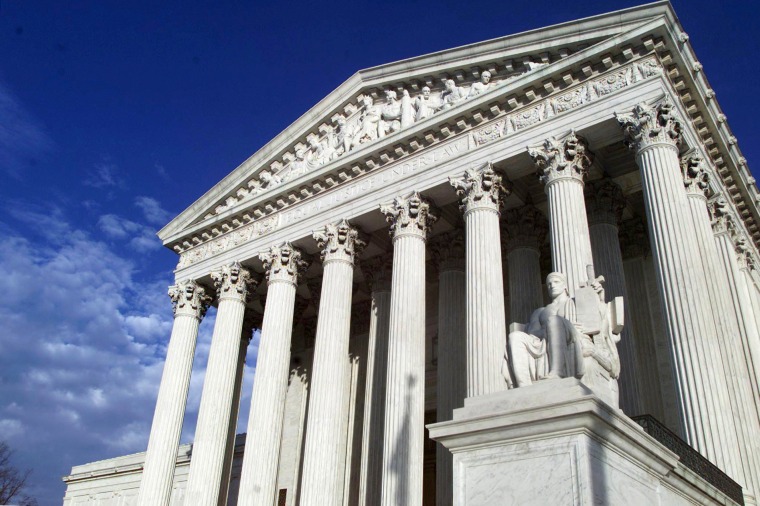Twice opponents of the Affordable Care Act have turned to the U.S. Supreme Court to tear down the nation's health care system, and twice a majority of the justices have declined.
Today, Republicans hope the third time's the charm.
The law's challengers, 18 red states led by Texas, are urging the court to rule that Obamacare's requirement for nearly all Americans to obtain health insurance or pay income tax penalties — known as the individual mandate — is unconstitutional. And they say the entire law must be scrapped.
How we arrived at this point is a bit of a mess. A few years ago, when Republicans approved massive tax breaks for the wealthy, they threw in an unrelated provision: the ACA's individual mandate, which the Supreme Court had already endorsed as part of Congress' taxing power, would now be lowered to zero.
That, in turn, gave some GOP lawyers an idea. If the Supreme Court had ruled that the ACA is permissible because of this tax, and the tax has effectively been eliminated, then "Obamacare" is no longer permissible. In effect, the provision of the reform law can't be a tax if it's zero, and if it's not a tax, it's an impermissible directive being imposed on Americans (even if the command has no teeth, because there are no adverse consequences for ignoring it). Ergo, the argument goes, the mandate is unconstitutional.
And, Republicans went on to argue, if the mandate is unconstitutional, and the policy is intertwined with the rest of the Affordable Care Act, then the only sensible thing to do would be to bring down the entire existing health care system and strip tens of millions of American families of their benefits and protections.
The week before Christmas in 2018, U.S. District Judge Reed O'Connor -- a Bush-appointed jurist in Texas -- found all of this persuasive, and agreed to strike down the entirety of the ACA, root and branch. Even many conservatives and ACA critics agreed that the ruling was indefensible, with reactions that included words and phrases such as "pretty bananas," "embarrassingly bad," and "absurd."
Once the Supreme Court agreed to take up Texas v. California, the original assumption was that there was simply no way the justices would take this seriously. But after Ruth Bader Ginsburg's passing, and with one-third of the high court made up of Donald Trump's chosen justices, anxiety among health care advocates reached new heights.
That anxiety is probably a little lower this afternoon. The HuffPost's Jonathan Cohn explained that through the court of oral arguments this morning, the Republicans trying to tear down the current system faced "a relatively hostile reaction" from the justices.
In oral arguments, both Chief Justice John Roberts and Associate Justice Brett Kavanaugh expressed skepticism about a key argument in the lawsuit ― specifically, that if one part of the Obamacare law is unconstitutional, then the entire law has to come off the books. In this case, the plaintiffs contend that when Congress in 2017 eliminated the fines associated with the ACA's "individual mandate" that most U.S. residents obtain health coverage, the mandate itself became unconstitutionality coercive, requiring invalidation of the entire statute. Republican attorneys general representing 18 states who brought the lawsuit think the whole program has to go. So does the Trump administration, which is backing the lawsuit.
As is often the case with Supreme Court arguments, there are all kinds of relevant details and nuances, but at its core, there are two questions the justices will answer: is the zeroed-out individual mandate unconstitutional, and if it is, can it be "severed" from the rest of the Affordable Care Act.
For Republican health care opponents, the answer to the first question is "yes," but the answer to the second is "no." For several justices on the Supreme Court this morning, the second half of the equation seemed like a stretch.
"Looking at our severability precedents, it does seem fairly clear that the proper remedy would be to sever the mandate and leave the rest of the law in place," Kavanaugh told Texas Solicitor General Kyle Hawkins (R).
At another point, Roberts told Hawkins that destroying the entire reform law, after Congress chose not to, is "not our job."
All of the usual caveats apply, of course, and it's a mistake to draw firm conclusions about what the justices might do from oral arguments. What's more, there are other possible outcomes, ranging from the justices tossing the case on standing grounds to Democrats rendering the case moot early next year by passing a small bill eliminating the mandate policy altogether -- a step that would be possible if Dems do well in Georgia's U.S. Senate runoff elections.
But all things considered, health care proponents have reason for cautious optimism.

